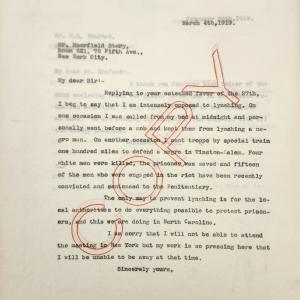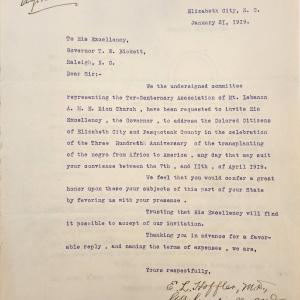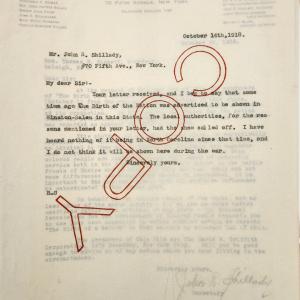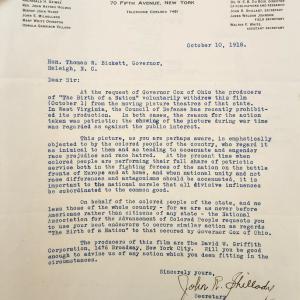- Transcription
At Tuskegee. Jan. 22, 1920
Governor Bickett, who has just returned from a visit to Tuskegee Institute in Alabama, today gave out the following interview:-
Tuskegee is a truly wonderful institution. It is a dream come true. There are today in actual attendance upon the Institution 1755 students. It is by far the largest negro school in the United States.
The institution has two aims, First, to teach the boys and girls who go there how to make a decent living, and, Second, how to lead a decent life.
The report of my speech sent out by the Associated Press is absolutely accurate, but as I spoke for something over an hour, the report could not and did not pretend to cover the entire speech. I think it is important for the public to know all that I said on the subject of race relations, and therefore I am asking the papers to print the following extract from my speech which is the only part of the speech that was reduced to writing:
"I have been asked to speak on race relations. Two things qualify me to speak on the subject. First, a passionate longing to help both races to a level of mutual sympathy and understanding. Second, my own relations with the Negro from my boyhood to this hour have been those of mutual sympathy, consideration and affection. This enables me to speak to you with the utmost kindness and at the same time with the utmost candor.
The first thought I desire to leave with you is that, in the South race relations will adjust themselves on a basis of wisdom and justice if the fools and firebrands in both races will let us alone. It requires sense and sympathy and patience to work out a reformation, but any fool can start a conflagration. A cow is not noted for mentality, but one kicked over a lamp and burned up the city of Chicago.
The next thought I desire to impress upon you is that real greatness and progress of men, of races and of nations are measured not by power or possessions, but by their contribution to the forces that make life brighter and sweeter for the average man. The nation or race that greatly serves, links up with the Father's will, and neither man nor devil can mar its glory or cheat it of its destiny. Hence I urge you to hearken to the wisdom of Booker Washington when he said, "We (the Negroes) ought not to allow our grievances to overshadow our opportunities."
This applies with equal force to the white race. It would just now be a priceless boon to a shell shocked world, a moral triumph that would make the angels sing and devils gnash their teeth; if all men would for a season forget their grievances and remember only their opportunities; if they would talk less of their rights and more of their duties; think less of what they can get out of the world and more of what they can put into it.
I frankly concede that in the search for right relations, and in the climb of both races to higher levels, the burden rests upon the white man to point the way. We are the dominant race, but our very supremacy is a challenge to do justice. We cannot do the Negro a great wrong without doing ourselves a greater injury. The white man owes it to his own traditions, to his own self-respect, and to his own self-preservation to guarantee to the Negro the fullest protection of the law. The South in denying to the negro any participation in the making and in the administration of the law, makes him in a very sacred sense the ward of the law. The settled policy of the South to maintain a white government, creates between that government and the Negro the relation of guardian and ward; and every principle of American jurisprudence, every whisper of conscience and every instinct of decency require the guardian to foster and protect the welfare of his ward.
This is an hour of isms and schisms. The same reconstructionist, the Utopian dreamer, the red-handed revolutionist, are all clamoring for attention, but the one safe path for the Negro to follow is the path that leads straight to the door of the white man's conscience. As your ardent friend I urge you to put every question that touches your well-being squarely up to the conscience of the white man and keep it there. Let it be known that you propose to appeal to no other tribunal, that through days and nights, in sun and rain, you are going to stand patiently at the door and knock; and not today, and perchance not tomorrow, but as surely as the Lord God liveth, some day that door will open wide and every plea born of wisdom and justice will be allowed.
Any other policy will certainly result in failure, and may result in tragedy. Radical measures of any kind will lock the wheels of your progress for fifty years. Appeal to fear and you will reap a riot. Resort to force and you will start up a Ku Klux Klan. Make a drive for political dominion, and the Red Shirt will again take the saddle. Again I say, lay your cause at the door of the white man's conscience and leave it there, for the white man's sense of justice is your dearest hope and your surest reliance."







